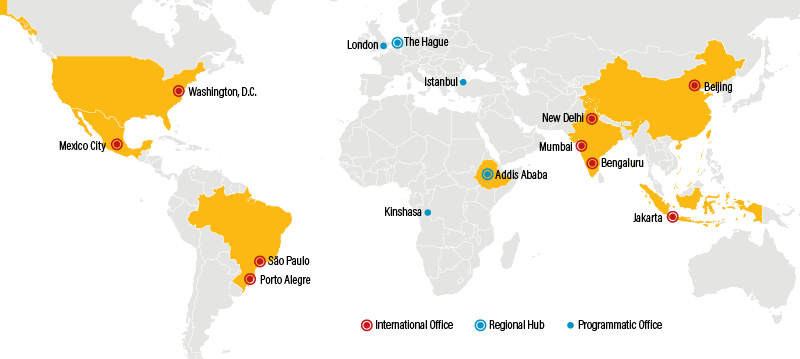Our View of the World
Our View of the World
Delivering Impact at Scale | Strategic Plan 2018-2022
Humanity stands at a critical point. Never have we been so successful, yet never has this success been so threatened by our own actions.

“We know there is a path to prosperity for all and a healthy environment—but we’re not on it. Shifting course quickly and at scale is the challenge of our generation. It’s what WRI’s new strategy is all about.”
—Wanjira Mathai Chair, Green Belt Movement, Kenya; Board Member, WRI
The World Resources Institute opened its doors in 1982, with the goal of bringing objective analysis and policy engagement to the pressing global challenges linking economic development, natural resources and the environment. Over the years, WRI has earned a reputation for practical solutions and global impact based on rigorous analysis and deep long-term engagement with governments, corporations, city leaders and communities.
In today’s turbulent world, WRI is more needed than ever.
While WRI’s mission has remained constant, our way of operating has changed to match the changing world. In the past decade we have internationalized, with offices now in 10 countries, programs in 60 countries and experts from more than 50. We have also become leaders in the use of new technologies and big data, while expanding the “do tank” side of our work to ensure better impact from our traditional “think tank” role. Most of our experts today are actively engaged with decision-makers on the front line.
While we are proud of our achievements, we know that what we’ve done is not enough. We are deeply aware that incremental change will not deliver the world we want, and neither will pilot successes. We thus expend great effort on the question of scale. What triggers the move from high quality design and successful demonstration to irreversible wide-spread adoption? Our last strategic plan (2014–2017) explored this in some detail. Our new strategy takes this approach to a deeper level.
We are aware that while our institution is expert at analysis and policy engagement, scaling is always a team effort. This explains why all our programs are in partnership with others. We are deeply grateful for our rich array of partners, and to our supporters and donors, who make our important work possible.
The Challenge We Face
Astonishing technological progress, globalization of markets and improvements in health and education have spurred economic progress at a pace unimagined in earlier eras. Real economic output rose 20-fold in the 20th century and could rise another 20-fold this century—a 400-fold increase in output in just two centuries. The share of the world’s population living in extreme poverty has fallen three- quarters since 1950, while average life expectancy rose from 48 to 72 years. In the past two decades, nearly 1 billion people have joined the global middle class.
Yet these gains have come at great cost. Inequality has risen, and globalized markets and technological shifts have heightened alienation. Trust in government has fallen as the public sector has overpromised and underdelivered. Benefits have been shared unevenly. Eighty-two percent of the wealth generated in 2017 went to just 1 percent of the global population, and more than 1.3 billion people still live in extreme poverty—on less than $1.25 per day.
Even more dramatic is the growing threat to the ecological systems that underpin economic progress. Greenhouse gas levels are higher today than at any time in the past 3 million years, driving bigger storms, droughts, fires and floods. The chemistry of the Ocean is changing faster than at any time in 300 million years, with unknown and perhaps dire impacts on the marine food chain. The rate of deforestation hit a new high in 2016, and species are becoming extinct so fast that biologists warn that we are living through the sixth mass extinction in Earth’s history.
These impacts are so profound that the International Union of Geological Sciences is expected to declare a new epoch—the Anthropocene—recognizing that human activity has become the primary driver of planetary change for the first time.
We find ourselves in a precarious and unprecedented condition. Our growing economic footprint is wreaking havoc on the very ecosystems that make that growth possible. The dawn of the Anthropocene is humanity’s wake-up call, an urgent alarm telling us that we must rapidly transform our economic and social systems to create a more just and sustainable society. If we don’t change course, things will get much worse.

“WRI has been on a remarkable journey over the past decade. Its reach, influence and impact have all leapt forward. But we must redouble our efforts to deliver change at scale in the years ahead.”
—James A. Harmon, Chairman, Caravel Management LLC; Chairman of the Board, WRI
The good news is that humanity doesn’t need to choose between a better economy and a better environment. Indeed, we can’t have one without the other: the planet is our support system. In almost all spheres of human activity, we can identify paths to greater prosperity that also shrink our ecological footprint:
Cities can be compact, connected and resilient, leading to increased efficiency, shorter commutes, better health and substantial reductions in resource use.
Food and agricultural systems can be reshaped so that growing populations can be well-nourished while degraded lands are restored to productivity.
Energy can be used much more efficiently and be largely decarbonized, thanks to dramatic progress in renewables and system integration.
Manufacturing and consumption can be restructured from today’s “take-make-waste” approach to circular models that reduce waste, reuse resources and recycle the rest.

OUR GLOBAL NETWORK AT A GLANCE
WRI’s more than 750 staff and experts work in more than 60 countries. We have international offices in Brazil, China, India, Indonesia, Mexico and the United States; regional hubs in Ethiopia (for Africa) and the Netherlands (for Europe) and program offices in Istanbul, Kinshasa and London.
In working to achieve global change at scale, we apply a threefold approach that is WRI’s hallmark:
COUNT IT
We start with data, creating user-friendly information systems, protocols and standards. We conduct independent, unbiased research to analyze relationships and design solutions, and communicate our findings in a compelling manner.
CHANGE IT
We work with leaders of cities, companies and countries to achieve change, testing our ideas in complex, messy, real-world situations. We set clear objectives and hold ourselves accountable.
SCALE IT
We identify and overcome barriers to change so that proven solutions spread quickly and widely. We work with coalitions of remarkable leaders who transform business sectors, societies and economies, nationally and globally.
The Change We Need
These transformations are all possible, yet they are not happening fast enough. Political, financial and psychological inertia, vested interests and a “lock in” of outdated infrastructure are major barriers to progress. A successful strategy must overcome these obstacles with self-reinforcing changes that snowball into non-incremental, systemic transformations.
Success will require disruptive political, social and corporate partnerships—movements rather than mere policy shifts—that are motivated by opportunity for a better future rather than by narrower environmental goals.
The challenge is vast and urgent, but recent developments provide grounds for hope. The digital technology revolution, policy innovations and emerging private sector leadership are opening the way for unprecedented breakthroughs. The Sustainable Development Goals and the Paris Agreement on climate change provide crucial frameworks for collective action.
WRI’s five-year strategy is built upon these insights. For more than 35 years we have been providing pioneering research, data, analytical insights and tools that have informed decision making and led to tangible impact. But in light of today’s threats, we will focus more sharply on achieving systemic change at scale.
Our biggest successes have had three common elements:
Rigorous research and analytical work, based on the best data, presented and communicated clearly for specific groups of decision-makers
Building coalitions for change, in which WRI adopts an unselfish stance, with others owning the initiative as much as we do
Sustained political and corporate engagement over several years, with a continuous focus on the opportunity for change at scale
Platforms for Systemic Change
In the coming years, WRI will focus our resources and energy on a limited number of initiatives that have these elements, which we call delivery platforms.

“We need to shift from doing better to doing enough. This will require a greater sense of urgency, and coalitions of like-minded leaders willing to make disruptive changes, so that solutions become irreversible and inevitable. WRI will support such leaders.”
—Andrew Steer President and CEO, WRI
Before embarking on a new activity and in assessing work already under way, we assess the potential for an effective delivery platform by asking ourselves the following questions:
Is there a clear vision and a case for action? Is the problem clearly measured and communicated? Is there a solution that is actionable, proven and attractive to citizens, business leaders and politicians?
Do we understand the politics? What are the obstacles? Who are the blockers? Who are the natural leaders? What coalitions might maximize the chance of success?
What is WRI’s unique contribution? What analytical gaps need filling, and where could we add the most value? Do we have a role in convening, organizing and building coalitions for change or supporting existing ones?
Are we ready and able to seize opportunities as they arise? (Most tipping points happen suddenly, when the ground is prepared and openings occur unexpectedly.)
The following pages contain examples of such delivery platforms. These include well-established initiatives, such as the Greenhouse Gas Protocol, Global Forest Watch, WRI Ross Center for Sustainable Cities, New Climate Economy and Aqueduct, all of which are being deepened for greater impact at scale. We also present emerging platforms with great promise, including the Building Efficiency Accelerator, Renewable Energy Buyers Alliance (REBA), NDC Partnership, Better Buying Lab, Champions 12.3 and P4G, The Partnering for Green Growth and the Global Goals 2030 Initiative. In all our programs, we will be seeking unprecedented opportunities to catalyze systemic change at scale.
Hallmarks of Our New Strategy
Over the coming years, we will be guided by seven imperatives that respond to changes in the world and draw upon what we have learned in our previous work.
1
We will focus on catalyzing the systemic changes required to address urgent global challenges.
We will think bigger, recognizing that incremental change is not enough. We will deepen our understanding of political and social processes, identify positive tipping points, and design and build delivery platforms to rapidly reach them.
2
We will increase our focus on jobs, health, gender and social equity, and human security.
We will motivate change with arguments of economic opportunity, health and social inclusion, in addition to environmental goals. We will begin new work on air quality and on resource scarcity, security and resilience with partners from the security community.
3
We will be at the forefront of the data revolution.
We will strengthen the “Count It” aspect of our approach, applying remote sensing, crowdsourcing, artificial intelligence and user-friendly data interfaces. We will lead a coalition to create a new, decision-friendly, open data, open source, integrated platform: Resource Watch.
4
We will make the best use of our global network.
We will share skills, lessons and ideas across the WRI network, placing staff and resources in our international offices and focusing growth in large emerging countries and Africa.
5
We will be disciplined in choosing what we do, creating clear strategies for turning ideas into action.
We will expand our capacity for action but not at the expense of our analytical depth.
6
We will act with more agility, accept more risk and manage it better.
We will—in view of the urgency of today’s challenges— sharpen our messaging and communicate with greater targeting and speed. We will assess and manage risks carefully but not shy away from them.
7
We will equip WRI for the new world in which we operate.
We will strengthen core services and make major new investments in staff recruitment, training and mentoring.